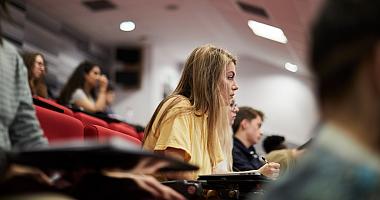BA (Hons)
Politics and International Relations (with Integrated Foundation Year)
Content navigation menu
Why study BA Politics and International Relations (with Integrated Foundation Year) at Goldsmiths
Discover the key institutions and ideas that are shaping the political world around you in these turbulent times.
- Our BA in Politics and International Relations (with Integrated Foundation Year) offers an alternative entry route for students without the qualifications required for degree-level study
- Before progressing onto one of the Department of Politics and International Relations' undergraduate programmes, you will have the chance to develop your academic skills and knowledge of the subject. At the point of application, you will select the undergraduate degree you wish to study but are able to change as you progress through the foundation pathway if your interests change
- You will receive an introduction to the study of politics and gain a better understanding of democracy, political parties, ideologies and movements
- Develop an understanding of the political background of contemporary issues such as Brexit, global governance, everyday conflicts around identity and culture, climate change and more
- View politics from a range of different perspectives, such as those of feminism, post-colonial thinking, or economics
- Learn to write about politics in useful ways, such as essays, political speeches and manifestos
- Develop your academic skills including how to present ideas effectively in writing; read, analyse and critically respond to a range of texts; participate effectively in academic discussion; identify how research is conducted in higher education; and compare different research methodologies
Contact the department
If you have specific questions about the degree, contact Will Davies or Simon Griffiths.
UCAS
Entry requirements
A-level: EE
BTEC: PP
Length
1 year (Foundation) followed by 3 years (Undergraduate Degree)
Fees
Home - full-time: £TBC
International - full-time: £TBC
Departments
Politics and International Relations
Centre for Academic Language and Literacies
What you'll study
Developing your academic skills
Alongside direct preparation for an undergraduate degree in Politics with International Relations, you will take two modules with our Centre for Academic Language and Literacies (CALL). These modules will help you develop the broader academic and research skills required for undergraduate study.
You will also learn how key social and political movements of the period have influenced the world we live in today through a cross-disciplinary module: Culture and Society in Post-war Britain. This module will cover topics such as 'Windrush and Migration', 'Irish Colonisation', 'Second-wave Feminism', 'Protest and Punk' and 'South-Asian Britain'.
| Module title | Credits |
|---|---|
| Reading and Writing Your World | 30 credits |
| Building Your Research World | 30 credits |
| Culture and Society in Postwar Britain | 30 credits |
| Politics in an Age of Crisis | 30 credits |
Note about optional modules (if available): The above is indicative of the typical modules offered, but is not intended to be construed or relied on as a definitive list of what might be available in any given year. The module content and availability is subject to change.
Teaching style
The Foundation Year provides you with core disciplinary and academic skills, as well as acting as a supportive bridge to induct you into university life. During your studies, you will be housed and supported within the Department of Politics and International Relations to ensure you are integrated into the department's ways of working before progressing onto your undergraduate degree.
How you'll be assessed
You’ll be assessed by a variety of methods that broaden your academic skillset. These include coursework assignments such as essays, case studies, critical commentaries, presentations and personal reflections.
Entry requirements
We accept the following qualifications:
A-level: EE
BTEC: PP
You are also required to have achieved a Level 2 qualification in GCSE English at Grade 4 or above.
For candidates who have not studied any Level 3 qualifications in the last two years, there are no formal qualifications required for admission, but you will need to demonstrate that you can benefit from the programme by undertaking an additional admissions process. This may involve an interview or request for the submission of written information used to assess suitability to study.
If you can't find your qualification here, then please visit our entry requirements page for a list of alternative qualifications.
International Qualifications
We also accept a wide range of international qualifications. Find out more about the qualifications we accept from around the world.
If English isn’t your first language, you will need an IELTS score (or equivalent English language qualification) of 6.0 to study this programme.
Fees and funding
Annual tuition fees
These are the UG fees for students starting their programme in the 2024/2025 academic year.
- Home - full-time: £TBC
- International - full-time: £TBC
If your fees are not listed here, please check our undergraduate fees guidance or contact the Fees Office, who can also advise you about how to pay your fees.
It’s not currently possible for international students to study part-time if you require a Student Visa, however this is currently being reviewed and will be confirmed in the new year. Please read our visa guidance in the interim for more information. If you think you might be eligible to study part-time while being on another visa type, please contact our Admissions Team for more information.
If you are looking to pay your fees please see our guide to making a payment.
Additional costs
In addition to your tuition fees, you'll be responsible for any additional costs associated with your programme, such as buying stationery and paying for photocopying. You can find out more about what you need to budget for on our study costs page.
There may also be specific additional costs associated with your programme. This can include things like paying for field trips or specialist materials for your assignments. Please check the programme specification for more information.
Skills and careers
Skills
Some of the skills you'll develop through your Foundation Year include:
- Effective communication through writing
- Critical and analytical skills
- Conducting various research methods
- The ability to bring together insights from a range of subjects
Careers
You will be encouraged to reflect on and identify career goals and ambitions to ensure you are suitably prepared for your transition to the full undergraduate degree programme.
Assessments will invite you to write in different ways, for example, in the form of a political speech or a manifesto, giving you skills that will benefit you in a career in government, NGOs, or politics itself.





